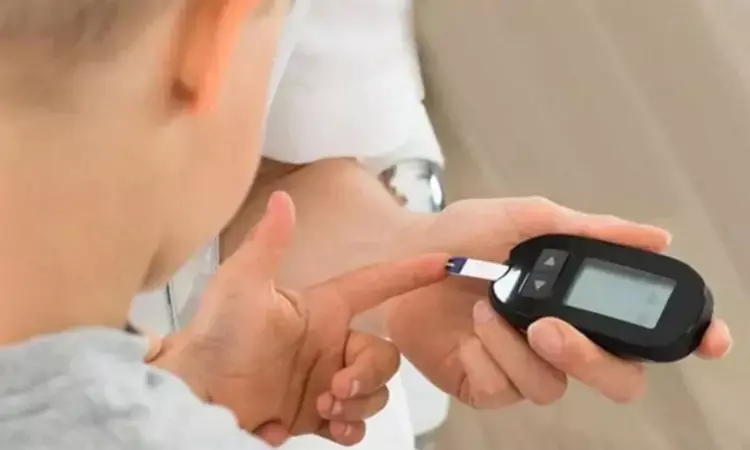- Home
- Medical news & Guidelines
- Anesthesiology
- Cardiology and CTVS
- Critical Care
- Dentistry
- Dermatology
- Diabetes and Endocrinology
- ENT
- Gastroenterology
- Medicine
- Nephrology
- Neurology
- Obstretics-Gynaecology
- Oncology
- Ophthalmology
- Orthopaedics
- Pediatrics-Neonatology
- Psychiatry
- Pulmonology
- Radiology
- Surgery
- Urology
- Laboratory Medicine
- Diet
- Nursing
- Paramedical
- Physiotherapy
- Health news
- Fact Check
- Bone Health Fact Check
- Brain Health Fact Check
- Cancer Related Fact Check
- Child Care Fact Check
- Dental and oral health fact check
- Diabetes and metabolic health fact check
- Diet and Nutrition Fact Check
- Eye and ENT Care Fact Check
- Fitness fact check
- Gut health fact check
- Heart health fact check
- Kidney health fact check
- Medical education fact check
- Men's health fact check
- Respiratory fact check
- Skin and hair care fact check
- Vaccine and Immunization fact check
- Women's health fact check
- AYUSH
- State News
- Andaman and Nicobar Islands
- Andhra Pradesh
- Arunachal Pradesh
- Assam
- Bihar
- Chandigarh
- Chattisgarh
- Dadra and Nagar Haveli
- Daman and Diu
- Delhi
- Goa
- Gujarat
- Haryana
- Himachal Pradesh
- Jammu & Kashmir
- Jharkhand
- Karnataka
- Kerala
- Ladakh
- Lakshadweep
- Madhya Pradesh
- Maharashtra
- Manipur
- Meghalaya
- Mizoram
- Nagaland
- Odisha
- Puducherry
- Punjab
- Rajasthan
- Sikkim
- Tamil Nadu
- Telangana
- Tripura
- Uttar Pradesh
- Uttrakhand
- West Bengal
- Medical Education
- Industry
Children with Well-Managed Type 1 Diabetes Show Arterial Changes: Research Stresses Early Intervention

Sweden: A study published in eClinicalMedicine reported that children with well-managed type 1 diabetes exhibited greater intima thickness in certain arteries than their healthy counterparts. The research, conducted on 45 children with diabetes and 37 without, utilized ultra-high-frequency ultrasound to identify early vascular changes, underscoring the crucial role of maintaining normoglycemia in preventing cardiovascular complications.
The authors emphasized that maintaining normoglycemia is crucial for cardiovascular prevention in children with type 1 diabetes, alongside early monitoring and potential pharmaceutical intervention for hypertension and hyperlipidemia. They highlighted the need for sensitive methods to detect and evaluate vascular changes over time, particularly in well-controlled pediatric diabetes populations like the study cohort.
The researchers note that cardiovascular complications remain a major concern in type 1 diabetes, with early atherosclerosis linked to hyperglycemia, hypertension, and dyslipidemia. Despite advances in diabetes management, children with type 1 diabetes continue to exhibit modifiable cardiovascular risk factors, highlighting the need for individualized prevention strategies.
To address this, Ebba Bergdahl, Department of Molecular and Clinical Medicine, Institute of Medicine, Sahlgrenska Academy, University of Gothenburg, Sweden, and colleagues used ultra-high-frequency ultrasound (UHFUS) to detect subtle vascular changes in children with well-regulated diabetes, aiming to explore associations with glycemic and metabolic markers for early intervention.
For this purpose, the researchers conducted a cross-sectional case-control study at Queen Silvia Children's Hospital, Gothenburg, Sweden, involving children with type 1 diabetes (CWD) aged 6–15.99 years with a diabetes duration of at least five years. Age- and sex-matched healthy controls were included for comparison. Participants with other medical conditions, treatments beyond insulin, abnormal findings, or difficulty undergoing examinations were excluded. UHFUS assessed the radial, dorsal pedal, and carotid arteries. Blood samples, blood pressure, BMI z-scores, and glucometrics were collected to evaluate vascular changes and metabolic markers.
Based on the study, the researchers reported the following findings:
- The study was conducted from February 25, 2019, to June 28, 2022, and included 50 children with diabetes (CWD) and 41 healthy controls. After exclusions, data analysis included 45 CWD (22 girls, 23 boys; mean age 12.0 years) and 37 healthy controls (19 girls, 18 boys; mean age 11.3 years).
- CWD had a mean HbA1c of 6.6% (48.1 mmol/mol).
- There were higher diastolic blood pressure (DBP) z-scores in CWD.
- CWD had significantly increased dorsal pedal (DP) intima thickness (IT), DP intima-media thickness (IMT), and radial IT compared to controls.
- In CWD, carotid IT was negatively correlated with time in range (r = −0.47) and time in tight range (r = −0.64), while it was positively correlated with glucose variability (r = 0.40).
- Time in tight range and longitudinal HbA1c were the strongest determinants for carotid IT in CWD.
- Type 1 diabetes diagnosis was the strongest determinant of IT across all arteries.
The researchers found that children with well-regulated type 1 diabetes exhibit early vascular changes in the radial and dorsal pedal arteries. Regression analyses highlighted strong associations between intima thickness and hyperglycemia and type 1 diabetes diagnosis, suggesting that structural arterial changes originate in the intima.
"Their findings reinforce the importance of maintaining normoglycemia to prevent cardiovascular complications. We emphasize the need for larger studies to validate these results and further explore their clinical implications," the researchers concluded.
Reference:
Bergdahl, E., Forsander, G., Sundberg, F., Milkovic, L., & Dangardt, F. (2025). Investigating the presence and detectability of structural peripheral arterial changes in children with well-regulated type 1 diabetes versus healthy controls using ultra-high frequency ultrasound: A single-centre cross-sectional and case-control study. EClinicalMedicine, 81, 103097. https://doi.org/10.1016/j.eclinm.2025.103097
Dr Kamal Kant Kohli-MBBS, DTCD- a chest specialist with more than 30 years of practice and a flair for writing clinical articles, Dr Kamal Kant Kohli joined Medical Dialogues as a Chief Editor of Medical News. Besides writing articles, as an editor, he proofreads and verifies all the medical content published on Medical Dialogues including those coming from journals, studies,medical conferences,guidelines etc. Email: drkohli@medicaldialogues.in. Contact no. 011-43720751


